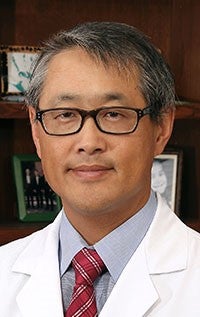2016 Research Day and Nathan A. Womack Surgical Society Meeting

The Department of Surgery hosted it’s first annual Research Day on May 5, 2016. The day featured poster and oral presentations by more than 50 residents and medical students.
In addition to the poster presentations, which took place in the lobby of the Neuroscience Hospital, residents made oral presentations later in the day and were able to attend informational sessions which focused on relevant topics including setting up a research database, basic statistical support, and others.
The department welcomed special guest Herbert Chen, MD, as the event’s visiting professor. Chen is an internationally recognized surgeon-scientist and medical educator, and chair of the Department of Surgery at the University of Alabama at Birmingham School of Medicine and Surgeon-in-Chief of the University of Alabama hospital system. He took in the poster and oral presentations and later delivered the Dr. George F. Sheldon Lecture
Several students described their research:
| “Our primary outcome is pain control, so we want to make sure patients are able to manage their pain. But, we’re also looking at the secondary effects of opioids and the impacts on the patients. We are still recruiting participants, but hopefully we can use the results of this study to establish a regimented pain management protocol.”
– Kathleen Marulanda, MD, a first-year resident, who is working on a research study evaluating the most effective means of pain management for patients following hernia surgery. |
|---|
| “Like a lot of things in plastic surgery, this gives you a framework to think about future problems. You may not see this exact problem again, but you may see something similar and you can say ‘I remember when we did that’ and figure something out a solution.”
– Patrick Mannal, MD, a plastic surgery resident, describing an innovative surgery technique recently used to help a patient maintain the appearance of her breast after a mastectomy. |
| “Using this simulator, you can basically run through the whole operation. Where we plan to go forward is assessing the residents this summer and hopefully seeing them improve with repetition, which we believe will happen because that’s what most simulators end up showing. We’ll also be using them at medical schools around the area and working on new simulators.”
– Yousef Abu, a first-year medical student who has developed a tracheostomy simulator. |
| “We looked at smoker status and how that affects the response to burn injuries. You may expect that if a smoker experienced an inhalation injury, their odds of fatality would go up. But, we found the rate of mortality is actually lower. When you think about it, smoking is a chronic inhalation injury and so it seems that over time, your body becomes more accustomed to that stress.”
– Laquanda Knowlin, MD, surgery fellow, on research into how co-morbidities affect the response to burn injuries. |
Several outstanding students were honored for their presentations and research accomplishments, including:
Best Oral Presentation: Megan Quintana, MD, for her presentation entitled “Bag3+ P209L Transgene Provides a Cardiac-Specific Murine Model of Non-ischemic Cardiomyopathy.”
Best Poster Presentation: Aimee Kim, MD, for her poster entitled “Mobilization of host hematopoietic cells increases engraftment after in utero hematopoietic cell transplantation (IUHCT)”
Proctor Award for Excellent Resident Research: Michael Phillips
